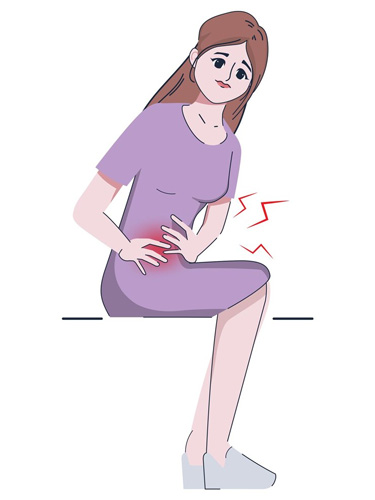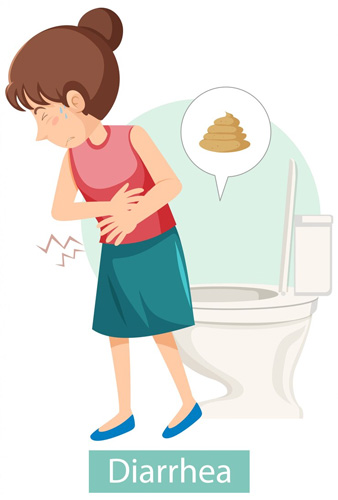Introduction
IBD inflammatory bowel disease is a term that describes disorders involving long standing ( chronic ) inflammation of tissues in the digestive tract.
Understanding Inflammatory Bowel Disease
IBD occurs due to an overactive immune system, which leads to inflammation throughout the gut and gastrointestinal tract.IBD is a more severe condition that may lead to a number of complications, including malnutrition and damage to the bowel.
Types
- Ulcerative colitis - this condition involves inflammation & sores ( ulcers) along the lining of large intestine & rectum
- Crohn's disease - this type of IBD is characterised by inflammation of the lining of the digestive tract , which often can involve the deeper layer of the digestive tract. Commonly affects the small intestine . It can also affect the large intestine & commonly upper GI tract .
Both ulcerative colitis & crohn’s disease characterised by diarrhoea , rectal bleeding, abdominal pain , fatigue & weight loss.

Symptoms of Inflammatory Bowel Disease
Symptoms vary as per severity of the disease. Common s/s in both - includes
- Diarrhoea
- Fatigue
- Abdominal Pain
- Cramps in Abdomen
- Reduced Appetite
- Unintended Weight Loss


Risk Factors
- Age: more common before 30 yrs old or some people don’t develop the disease until their 50’s or 60’s.
- Family history: higher risk if relatives like parent ,sibling having same health issue.
- Cigarette smoking:most important risk factor for developing crohn’s disease.
- Nonsteroidal anti-inflammatory medications: it may worsen the disease condition.
Diagnosis
- endoscopy ( contrast radiography, MRI,CT )
- stools samples
- blood tests
Homoeopathy and IBD
Homoeopathic remedies offer potential relief for symptoms associated with IBD.Homoeopathy offers a holistic approach to managing symptoms associated with Inflammatory Bowel Disease (IBD), including Ulcerative Colitis and Crohn's Disease. By addressing the underlying imbalances within the body and promoting self-healing, homoeopathic remedies can provide relief from symptoms, improve overall well-being, and support long-term health outcomes for individuals with IBD.
- Merc Sol
- Stools Greenish, bloody and slimy,
- Worse at night, with pain and tenesmus. -Never-get-done feeling.
- Discharge accompanied by chilliness, sick stomach, cutting colic, and tenesmus.
- Whitish-grey stools.
- Sulphur
- Itching and burning of anus;
- piles dependent upon abdominal plethora. -Frequent, unsuccessful desire; hard, knotty, insufficient.
- Child afraid on account of pain.
- Redness around the anus, with itching. Morning diarrhoea, painless, drives out of bed, with prolapsus recti.
- Haemorrhoids, oozing and belching.
- Aloes Soc
- Weak feeling, as if diarrhoea
- Great accumulation of flatus,with urging to stool. -Colic before and during stool.
- Burning, copious flatus.
- Constant bearing down in rectum;
- bleeding, sore, and hot; relieved by cold water.
- Feeling of weakness and loss of power of sphincter ani.
- Sense of insecurity in rectum, when passing flatus.
- Uncertain whether gas or stool will come. Stool passes without effort, almost unnoticed.
- Lumpy, watery stool. Jelly-like stools, with soreness in rectum after stool.
- A lot of mucus, with pain in rectum after stool. Haemorrhoids protrude like grapes; very sore and -Diarrhoea from beer.
- Argentum Nitricum
- Stools- Watery, noisy, flatulent; green, like chopped spinach, with shreddy mucus and enormous distention of abdomen;
- very offensive.
- Diarrhoea immediately after eating or drinking.
- Fluids go right through him; after sweets.
- After any emotion with flatulence. Itching of anus.
- Phosphorus
- Very foetid stools and flatus.
- Long, narrow, hard, like a dog's. Difficult to expel. -Desire for stool on lying on, left side. Painless, copious debilitating diarrhoea.
- Green mucus with grains like sago.
- Involuntary; seems as if anus remained open. Great weakness after stool.
- Discharge of blood from rectum, during stool. White, hard stools.
- Bleeding haemorrhoids.
Benefits of Homoeopathic Treatment
- Individualised Care: Homoeopathy recognizes that each person is unique. A homoeopath will assess your symptoms, medical history, and lifestyle to prescribe a personalised treatment plan tailored to your needs.
- Gentle and Natural: Homoeopathic remedies are derived from natural substances and are known for their minimal side effects. They work in harmony with the body, promoting self-healing and overall well-being.
- Holistic Approach: Homoeopathy takes into account not only the physical symptoms but also the emotional and mental aspects of an individual. It aims to restore balance at all levels, providing comprehensive care.
- Long-Term Relief: By addressing the underlying causes of Ulcerative Colitis,homoeopathy strives to achieve long-term relief and improved quality of life.
Consulting a Homeopath
For personalised treatment and guidance, consulting a qualified Sanjivani homoeopath is essential. They will assess your symptoms, medical history, and individual constitution to prescribe appropriate remedies.
Sanjivani Homeopathy Clinic USP
- No homoeopathy Dietary Restrictions:
Allows patients to enjoy foods like onion, garlic, and coffee, ensuring a stress-free treatment journey.
- 24/7 Online Consultations:
Enables convenient access to doctors with detailed counseling, history management, and follow-ups.
- Highly Skilled Team:
Experienced BHMS and MD doctors, supported by multilingual and professional staff.
- Patient-Centric Care:
Simplifies treatment with modern, adaptable solutions and clear communication.
Click Here for Detailed "Sanjivani USP"
FAQ's
- What is homoeopathy ?
Homoeopathy is a holistic science which belives in the law of Similia Similibus Curenter i.e Like Cures Like .It was discovered by Dr Samuel Christian Hahnemannn in 1796.
- Is there any side effects of homoeopathy?
As homoeopathic medicines are made from natural substances this medicines have no side effects and are completely safe to consume
- Is there any diet restriction to take homoeopathic medicines?
There are no diet restrictions for homoeopathic medicines. One should only avoid eating or drinking any liquid other than water at least 30 minutes before and after taking homoeopathic medicines.
Click Here for "Frequently Asked Questions."
Conclusion
Sanjivani Homoeopathy offers a holistic approach to managing symptoms of IBD, addressing not just the physical manifestations but also considering the emotional and mental aspects of the individual. While it may not cure the underlying condition, it can provide significant relief from symptoms and improve overall well-being. However, it's crucial to consult with a Sanjivani homoeopath for tailored treatment suited to your specific needs.
Disclaimer : The information provided in this blog is for educational purposes only and should not be considered medical advice. Please consult with a qualified healthcare professional before starting any treatment for Inflammatory Bowel Disease or any other medical condition.


